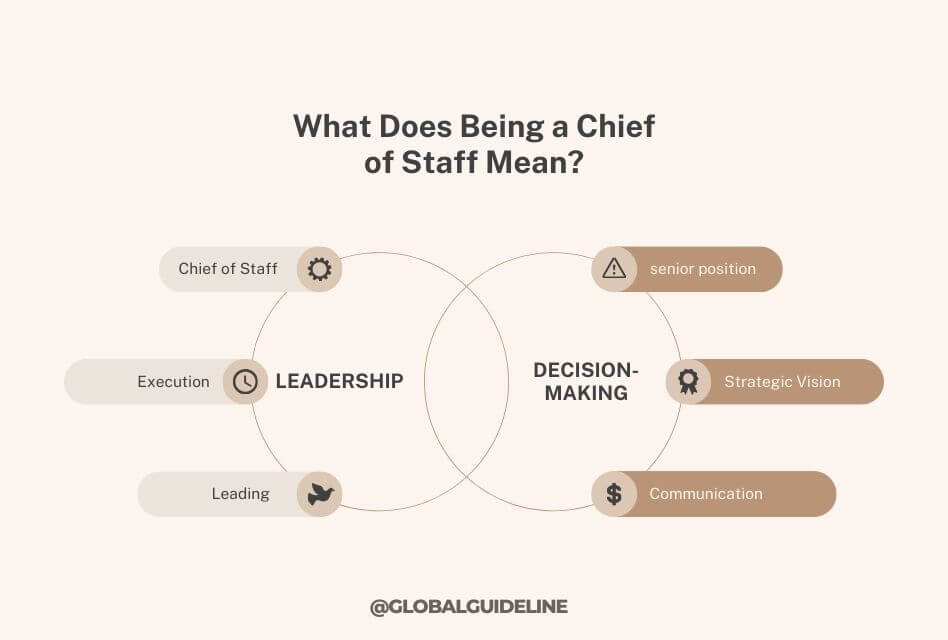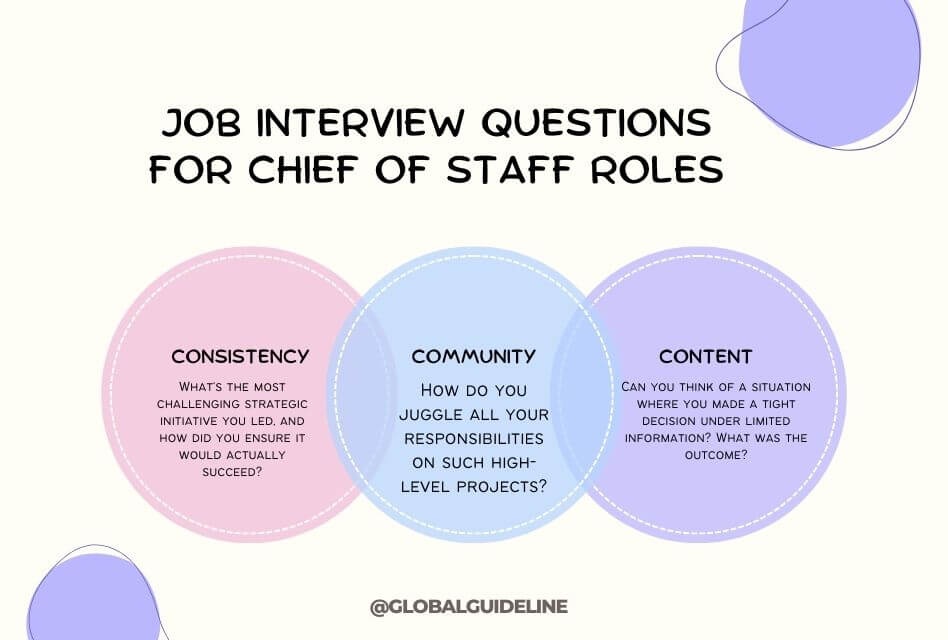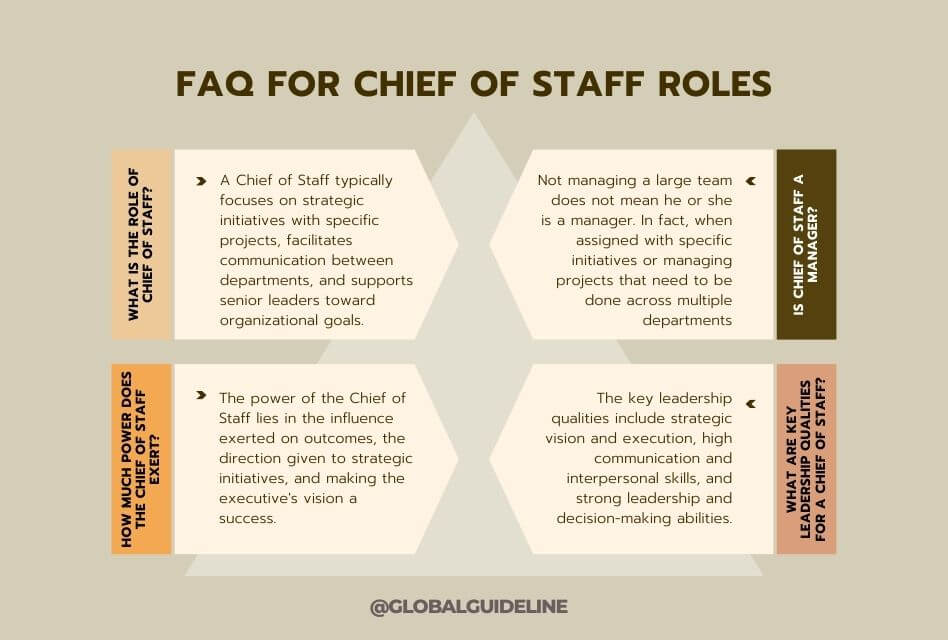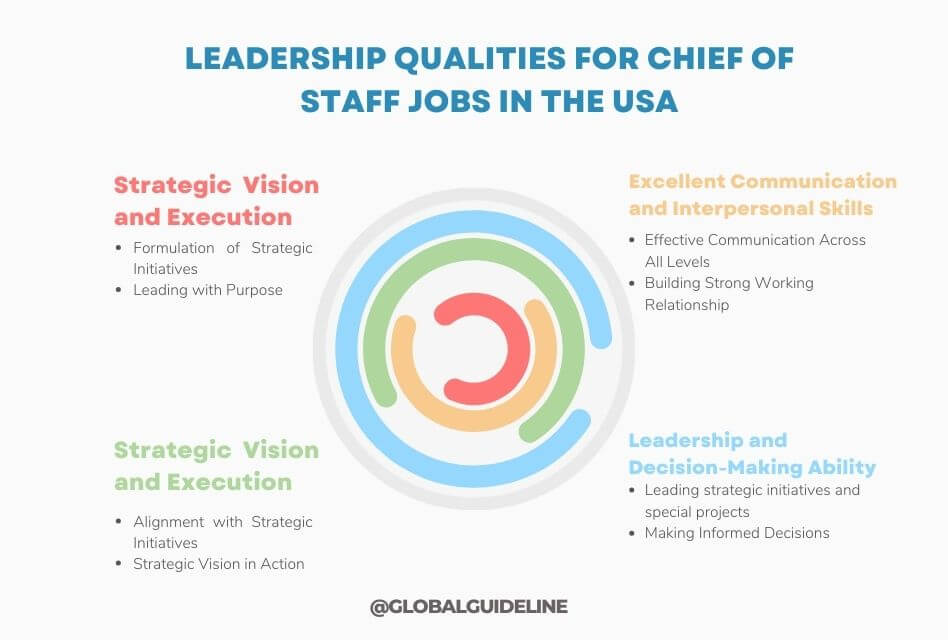The CoS role is quickly becoming a key position in organizations, and nowhere more so than in the United States. Businesses and institutions are always looking for ways to enhance their leadership dynamics, which makes the position of a Chief of Staff often conveniently enough to help hold different strategic initiatives and special projects under one umbrella. But what makes for an effective Chief of Staff jobs? This article analyzes the top three leadership qualities to position a Chief of Staff job in the USA, and it gives insights into what it takes to come out on top of this high-level position.
Table of Contents

What Does Being a Chief of Staff Mean?
But before defining the required leadership qualities, it would be important first to explain what a Chief of Staff does. The Chief of Staff is that trusted advisor of a senior executive in an organization, managing all key projects, facilitating departmental communication, and always ensuring that strategic goals for organizations are met. This role combines a unique blend of strategic thinking, leadership, and operational expertise.
Is the Chief of Staff a senior position? Absolutely. Chief of Staff is more like a senior-level position, which places him always just below the CEO or other chief executives. This role requires the Chief of Staff to understand the operations of the organization and the vision for where it is headed.
The Chief of Staff is distinguished from the CEO, wherein the latter owns and operates the overall direction and success of the company, while the Chief of Staff is the extension of the CEO in its vision and executes this vision within the organization.
1. Strategic Vision and Execution
A Chief of Staff needs to know how to formulate and implement strategic vision. That’s because often it is the Chief of Staff who is tasked with overseeing the strategic initiatives that will fulfill the objectives of the organization.
Formulation of Strategic Initiatives
A Chief of Staff should have a proactive mindset in recognizing what opportunities lie within the company itself or the entire market.
He or she will work under the senior leadership team to create and align the goals of the projects created by the company with the long-term strategies of the company.
The core responsibilities that usually emerge on the job description of the Chief of Staff include their ability to strategize on any given project and oversee its implementation.
What are some of the roles of the Chief of Staff? These will typically include responsibility for leading the execution of major strategic programs, coordination of cross-functional initiatives and efforts, as well as maintaining a focus in the leadership team on what needs to be done to deliver the mission of the company.
Leading with Purpose
Setting priorities and distributing the organization’s resources should also become part of strategic leadership. The Chief of Staff should realize how to satisfy short-term needs in the light of long-term goals while guiding the organization through the maze of complex challenges and ultimately keeping the focus at the destination.
In terms of salary, Chief of Staff jobs usually range from around $60,000 to $150,000. Depending on what responsibility the job holds and what exactly it encompasses, they can have that much difference in salary; however, if the Chief of Staff is actually good at strategic vision and execution, they’re usually well-paid.
How influential is the Chief of Staff? The Chief of Staff may not possess the same authorities as the CEO, but the influence is immense. He makes important decisions that define the organization’s way into the future and ensures that strategic objectives are met.
2. Excellent Communication and Interpersonal Skills
The Chief of Staff must have very excellent communication and interpersonal skills. After all, since the Chief of Staff usually acts as the main liaison between the senior executive and the rest of the organization, effective communication is quite crucial.
Facilitating Seamless Internal Communications
Indeed, the Chief of Staff is one of the positions that represent the top level within the organizational hierarchy. He usually reports to the CEO or other senior executives and takes care of some critical functions thus ensuring effective realization of the leadership team’s vision throughout the company. A Chief of Staff is also seen as a strategic partner that coordinates special projects, oversees the flow of information, and even makes decisions on behalf of the executive.
Is the Chief of Staff a manager? Although the Chief of Staff would not be so if he or she were responsible for managing a large team as part of their day-to-day work, the Chief of Staff manages specific projects, leads initiatives, and often coordinates the work of other team members in important tasks. It is leadership without direct authority, making the ability to influence and guide others one of the most important tools for getting the job done.
A Chief of Staff collaborates with a CEO in terms of overseeing day-to-day, managing strategic initiatives, and ensures that every minute of the CEO’s time is high-impact activity. The CEO establishes the overall vision and strategy for the company, but it is the Chief of Staff who ensures that the set plans are carried out efficiently.
Now that we understand what the role is, let’s jump deep into the top three leadership qualities required for success in Chief of Staff jobs in the USA.
1. Strategic Vision and Execution
Certain must be the vision that a Chief of Staff must have for developing and implementing a strategy. To do this will also mean knowing the general direction of the organization and how that may be translated into plans to be taken forward in and through various departments.
Alignment with Strategic Initiatives
A good chief of staff should be fully knowledgeable about the strategic initiatives in the organization. This way, they will be able to identify which projects are most important for the company’s long-term goals and ensure that there are adequate resources for these initiatives. The chief of staff is usually responsible for assisting the senior executive team in prioritizing such initiatives and tracking their progress.
The Chief of Staff role involves not only oversight but also seeing ahead of time the potential challenges and opportunities, making plans, and continually changing them to ensure the organization remains on track.
Strategic Vision in Action
Consider, for instance, a Chief of Staff in a technology firm, whose main goal is market share expansion. Such a CoS would earn for agreeing that the development of products keeps up with marketing efforts and sale approaches through growth goals. This may as well encompass coordination of cross-functional teams, tracking, and plan adaptation based on responses to markets.
Salaries for this job are usually reflective of the strategic nature of the role and would include rewards on the potential of driving key organizational outcomes.
2. Excellent Communication and Interpersonal Skills
Above all else, an excellent Chief of Staff will need to possess exceptional communication and interpersonal skills. Effective communication and interpersonal skills will have to enable them to present information clearly and effectively and build strong relationships across the organization so that everyone is aligned and working toward common goals.
Effective Communication Across All Levels
As important as it is to get hold of the most senior executives or even the frontline employee, the chief of staff needs to facilitate meetings, give presentations, and make sure that everyone in the team knows what the strategic direction of the company is. Clear communication will prevent misunderstandings and align efforts while fostering a collaborative work environment.
So, what does the Chief of Staff do? One core obligation is to be a communication relay between the leadership team and the rest of the organization; the messaging should be universally consistent, and the feedback has to flow both ways.
Building Strong Working Relationship
Interpersonal skills are also necessary because the Chief of Staff will often need to negotiate with departments and work out conflicts that sometimes may demand consensus on key issues. The ability to influence others, along with building trust, is critical in leading special projects in ensuring the initiative culminates into success.
How influential is the Chief of Staff? In many ways, the influence of a Chief of Staff often rests in making positive things happen by relationships and the way one would communicate their ideas; it is not necessarily the dicta orders.
Chief of Staff jobs remote options are plentiful, which underscores the importance of good communication skills, since leading teams and managing projects from a distance needs a high caliber of plain and effective communication.
3. Leadership and Decision-Making Ability
A third aspect of a Chief of Staff is the ability to lead and make effective decisions. This may call for leading teams through complex problems, making hard calls when appropriate, and making sure to align with strategic goals.
Leading strategic initiatives and special projects
Chiefs of Staff are, in most cases, given a wide portfolio because they form part of spearheading strategic initiatives and special projects that cut across departments. It requires big leadership traits: team motivation, resource utilization, and ensuring a project runs to a successful conclusion.
A Chief of Staff job description entails directing special projects, ensuring the executive agenda is properly directed, and taking important decisions with huge implications on the running of the organization. Leadership here has nothing to do only with managing people; it also has a lot to do with managing processes and then ensuring that the visions of the executive come to fruition.

Making Informed Decisions
One of the key areas of a Chief of Staff’s work is decision-making. Decisions regarding resource allocation, which way to go in a crisis, or what strategic initiative to emphasize are some examples. Decisions need to be timely, informed based on facts and statistics that support the choice, aligned with the desired goals, and considered with all potential ramifications for all the stakeholders.
NYC, like other major cities, has chief of staff jobs that call for more than strategic thinking; sometimes, they demand leadership that finds its own way through the head spin of large organizations.
Higher education chief of staff jobs rely more on leadership since such management roles handle initiatives affecting and representing various departments, faculties, and students.
Job Interview Questions for Chief of Staff Roles
Before you appear for a job interview for a post of Chief of Staff, you will have to be ready to tackle questions related to the evaluation of your potential as a leader, strategic thinker, and communicator. Here are the few most common ones:
- What’s the most challenging strategic initiative you led, and how did you ensure it would actually succeed?
This question will assess your ability to manage complex projects and derive results within the organization. - How do you juggle all your responsibilities on such high-level projects?
The employer is looking for how you can maximize usage of time and resources to get the best out of the project. - Can you think of a situation where you made a tight decision under limited information? What was the outcome?
This is going to be your test of decision-making ability coupled with stress operation. - How would you ensure effective communication across different levels of the organization?
This is about your skills for communication and your ability to get everyone aligned within the organization.
Frequently Asked Questions
1. What is the role of Chief of Staff?
A Chief of Staff typically focuses on strategic initiatives with specific projects, facilitates communication between departments, and supports senior leaders toward organizational goals.
2. Do you consider the role of Chief of Staff as an executive role?
Yes, the Chief of Staff is, after all, considered a top-level position and at times directly reports to a CEO or other senior levels in the organization; it directly participates in the leadership team.
3. Is Chief of Staff a manager?
Not managing a large team does not mean he or she is a manager. In fact, when assigned with specific initiatives or managing projects that need to be done across multiple departments, it means that he or she needs to coordinate cross-functionally.
4. How much power does the Chief of Staff exert?
The power of the Chief of Staff lies in the influence exerted on outcomes, the direction given to strategic initiatives, and making the executive’s vision a success.
5. What are key leadership qualities for a Chief of Staff?
The key leadership qualities include strategic vision and execution, high communication and interpersonal skills, and strong leadership and decision-making abilities.

Conclusion
The job of Chief of Staff is challenging and rewarding at the same time, requiring that particular leadership quality blend of a person to support all the senior executives of the organization and deliver success for the organization. Top 3 Leadership qualities needed for Chief of Staff jobs in the USA are strategic vision and execution, excellent communication skills, and big leadership with capabilities for decision making.
Whether you are considering a Chief of Staff position or are already part of the role but are seeking to be more effective, focusing on these leadership qualities will assist you in working your way through the complexities of the job and have a significant impact on the success of your organization.
Related Posts:
What Are the 5 Hidden Things That Sabotage Vision and How to Overcome Them?
7 Ways Performing Manufacturing Operations Boosts Supply Chain Success










